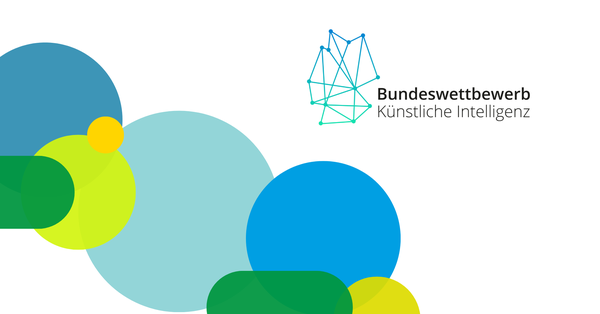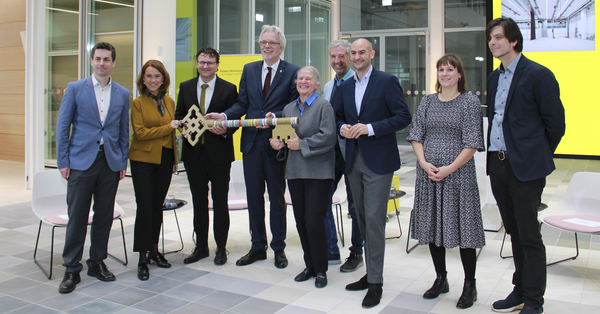Changing the world with AI
High-school students find extraordinary solutions

On Friday, the projects of the finalists of the BWKI were presented in Tübingen. The award ceremony in the evening was broadcast live on YouTube. Beforehand, the top-class jury had decided on the winners of the competition.
The main prize of the competition went to three 17-year-olds from the team “buffalo” from Erfurt, who developed an algorithm that analyzes pronunciation and detects speech abnormalities. In the future, the AI can be used in logopedic treatments or support the learning of foreign languages. The winners received a cash prize of 1500 euros.
AI artist Mario Klingemann announced the winners of the young talent award. The team “SMAILE” from the boarding school Schloss Hansenberg in Geisenheim convinced with their AI, which allows to take photos intelligently and avoids unaesthetic, blurred or unsatisfactory shots. The team receives a cash prize of 500 euros and access to an online AI course.
In the special category of environment and sustainability, juror and marine biologist Ute Wilhelmsen announced the winner. Katharina Bade from Magdeburg analyzed the breeding behavior of kestrels nesting in the walls of her high school with her project Siemens Falcons. The 17-year-old can look forward to a cash prize of 500 euros and an internship at a German marine research institute. The prize was donated by the German Alliance for Marine Research.
The juror and moderator of the BWKI award ceremony, Philip Häusser, selected the winner in the special category of hardware. Maximilian Kraeft from Stollberg, Saxony, developed an autonomous robot in his project “tars” that has the ability to recognize obstacles and find its way through a maze. The 17-year-old will receive a cash prize of 750 euros.
On Friday evening, viewers of the live broadcast had the opportunity to vote for their favorites, and thus for the winners of the audience award. This year’s audience award went to three 17- to 18-year-old young people from Erfurt, who use their AI “hateflow” to identify and punish hate and inflammatory comments on the Internet. The prize was endowed with 500 euros.
The St. Augustin Gymnasium in Grimma, Saxony, defended its title as “AI School of the Year”. Thanks to the above-average participation of students from this school in the online AI course, the prize was awarded once again. As a prize, the high school received a class set of a sensory bionics construction kit (bionics4education).
“AI is a real game changer”
The BWKI final event had kicked off with the Hackathon on November 6 and 7, 2021. Together with the Badisches Landesmuseum and in cooperation with the Hack & Söhne initiative, challenges were set under the motto “Write Code – Write History”. Participants were asked to develop AI applications that would be used in museums of the future to optimize knowledge transfer. The winning project by a 16-year-old student uses augmented reality to bring museum objects to life. The four 17- and 18-year-old students on the “Hyperion” team generated new artworks based on museum data. The winning team will be supported by the Badisches Landesmuseum in the continuation of its project idea. Furthermore, book prizes and participation in different online courses were awarded to other teams.
“Artificial intelligence is one of the most important and exciting topics of our time, it is a real game changer. In the BWKI, teenagers and young adults can actively shape this important topic of the future,” explained Baden-Württemberg’s Science Minister Theresia Bauer, Chairwoman of the Carl Zeiss Foundation Administration and patron of the BWKI. “Children have curiosity and fun. That makes them ideal researchers and they can live that out at BWKI,” said Professor Bernhard Schölkopf, Director at the Max Planck Institute for Intelligent Systems and one of the initiators of the competition. “It is just great and inspiring to see the creativity, skill and perseverance of the students in this competition. I dream of a society where we encourage each other a lot more to develop and try out good ideas,” added Professor Matthias Bethge, co-initiator of the competition and head of the Tübingen AI Center, BMBF Competence Center for Machine Learning.
The jury of the competition this year included: Mario Klingemann (AI artist), TheMorpheus (YouTuber and computer scientist), Andrea Kranzer (business angel), Dr. Philip Häusser (physicist, TV presenter, web video producer), Dr. Ute Wilhelmsen (marine biologist), Prof. Dr. Veronika Eyring (climate scientist DLR and Univ. Bremen), Christoph Röscher (Bosch Center of Artificial Intelligence), Dr. Nina Gaissert (expert in bionics, Festo), Marlene Prautsch (Datascientist), Prof. Dr. Matthias Bethge, Dr. Wieland Brendel (initiators of the competition, University of Tübingen), Prof. Dr. Bernhard Schölkopf (initiator of the competition, Max Planck Institute for Intelligent Systems).
More than 150 students had entered their project ideas in the 2021 competition. In the final, ten teams presented themselves to the jury and the audience. The basics of AI can be learned in a free online AI course offered by BWKI. So far, more than 4,000 students, teachers and interested parties have already taken advantage of the BWKI's offerings.
The BWKI will be held again next year. The main sponsor of the competition is the Carl Zeiss Foundation. The competition was also supported by Bosch, Festo, paperspace, Google, Verlagshaus Droemer and Knaur, and was held in cooperation with Cyber Valley, the Media University and the German Alliance for Marine Research.
About the BWKI:
BWKI motivates students to use the tools of artificial intelligence to implement their own ideas for a better world of tomorrow. The national competition was launched in 2018 at the AI research site in Tübingen by the Competence Center for Machine Learning and enables young people to actively demonstrate their skills in the AI research environment. For more information, visit https://bw-ki.de and https://ki-kurs.org.
About the Carl Zeiss Foundation:
The Carl Zeiss Foundation’s mission is to create an open environment for scientific breakthroughs. As a partner of excellence in science, it supports basic research as well as applied sciences in the STEM subject areas (science, technology, engineering and mathematics). Founded in 1889 by the physicist and mathematician Ernst Abbe, the Carl Zeiss Foundation is one of the oldest and biggest private science funding institutions in Germany. It is the sole owner of Carl Zeiss AG and SCHOTT AG. Its projects are financed from the dividend distributions of the two foundation companies.
Video
Related Articles

School pupils compete in the Federal Competition for Arti...







